2022-2023 学年江苏省徐州市高三上学期期中英语试题及答
注意事项∶
案
1. 答卷前, 考生务必将自己的姓名、考生号、考场号、座位号填写在答题卡上。
2. 回答选择题时, 选出每小题答案后, 用铅笔把答题卡上对应题目的答案标号涂黑。如需
改动, 用橡皮擦干净后, 再选涂其他答案标号。回答非选择题时, 将答案写在答题卡上,
写在本试卷上无效。
3. 考试结束后, 将本试卷和答题卡一并交回。
第一部分 听力(共两节, 满分 30 分)
做题时, 先将答案标在试卷上。录音内容结束后, 你将有两分钟的时间将试卷上的答案转
涂到答题卡上。
第一节(共 5 小题;每小题 1. 5 分, 满分 7. 5 分)
听下面 5 段对话。每段对话后有一个小题, 从题中所给的 A、B、C 三个选项中选出最佳选
项。听完每段对话后, 你都有 10 秒钟的时间来回答有关小题和阅读下一小题。每段对话仅
读一遍。
1. What kind of cake did the woman make?
A. The lemon cake. B. The chocolate cake. C. The strawberry cake.
2. When will the woman have some free time?
A. This Friday. B. Next Wednesday. C. Next Thursday.
3. What will the woman probably do next?
A. Do some chores.
B. Go out with her friend. C. See a movie with her brother.
4. Which candle does the man decide to buy?
A. The apple and pine candle.
B. The orange and walnut candle.
C . The chocolate and coffee candle.
5. What are the speakers mainly talking about?
A. Preparing some food. B. Shopping for a party. C. Cleaning up after a disaster.
第二节
听下面 5 段对话或独白。每段对话或独白后有几个小题, 从题中所给的 A、B、C 三个选项
�
中选出最佳选项。听每段对话或独白前, 你将有时间阅读各个小题, 每小题 5 秒钟∶听完
后, 各小题将给出 5 秒钟的作答时间。每段对话或独白读两遍。
听第 6 段材料, 回答第 6、7 题。
6. What Kind of transport does the man want to try?
A. Helicopters.
B. Cars. C. Planes.
7. What does the woman trust most?
A. Statistics. B. Her own feelings. C. Safety reports.
听第 7 段材料, 回答第 8 至 10 题。
8. When did the man last have his hair cut?
A. One month ago.
B Two months ago. C. Twelve months ago.
9. How long was the man’s hair in his youth?
A. Down to his back. B. Down to his collar. C. Down to his shoulders.
10. What is the relationship between the speakers?
A. Friends. B. Husband and wife. C. Hairdresser and customer.
听第 8 段材料, 回答第 11 至 13 题。
11. Where are the speakers?
A. In the forest. B. In the desert. C. In the mountains.
12. How does the man feel?
A. Worried B. Excited. C. Confident.
13. What will the speakers probably do next?
A. Listen to the radio. B. Change their direction. C. Help with the cows on the road.
听第 9 段材料, 回答第 14 至 16 题。
14. What does the man say about the countryside?
A. It has narrow roads.
B It is flat. C. It is inconvenient.
15. How did the man lose his ability to walk?
A. He fell down the mountains when hiking.
B. He had an accident when taking an elevator.
C He had an accident when riding a motorbike.
16. How does the woman feel in the end?
�
A. Sympathetic. B. Disappointed. C. Confused.
听第 10 段材料, 回答第 17 至 20 题。
17. What did China sell to the Bomans?
A. Silk. B. Glass. C. Silver.
18. How many areas of Britain were controlled by the Romans?
A. Two. B. Three. C. Four.
19. Which of the following is the shortest?
A, Hadrian’s Wall.
B. The Antonine Wall. C. The Great Wall.
20. What is still in use today?
A. Baths made by the Romans. B. Toilets made by the Romans. C Roads made by the Romans.
第二部分 阅读(共两节, 满分 50 分)
第一节 (共 15 小题;每小题 2. 5 分, 满分 37. 5 分)
阅读下列短文, 从每题所给的 A、B、C、D 四个选项中选出最佳选项。
A
Humanities Mentors
Humanities Mentors (导师) are student volunteers. They build community for
current students in Humanities Series and connect them with other humanists on campus.
Main duties for mentors
● Help undergraduates with the humanities on campus, including the Humanistic
Studies certificate. Offer advice about reading, writing, course selection, and
international experiences.
● Participate in Humanities forum, where students improve their papers with
the help of Mentors.
● Involve students in discussing literature, philosophy, history, and art.
● Write brief blogs about humanities experiences on campus and beyond.
● May serve as chairman, who leads Humanities forum. Become a Humanities Mentor
Please fill out the Google Form if you would like to become a Humanities Mentor.
Meet with a Humanities Mentor
Are you interested in the humanities? Have you taken a Humanities Sequence, and
�
don’t know what to do next? Want to learn about humanities opportunities at and
beyond Princeton? We encourage you to email one of our Humanities Mentors for advice
about course selection, the Humanistic Studies certificate, internships, and more.
During the academic year, the Coffee Conference program enables students
interested in the humanities to ask Humanities Mentors for advice over an informal
cup of coffee. To participate, students can contact anyone in the Mentor directory
to schedule a coffee conference (coffee’s on us. ).
1. Who is this passage intended for?
A. Professors.
B. Undergraduates.
C. High school students. D.
Parents.
2. What is a duty of Humanities Mentors?
A. To build communities beyond campus.
B. To provide certificates for students.
C. To help improve the students’ papers.
D. To write blogs about life experiences.
3. What can the students do to meet with a humanities Mentor?
A. Fill out the Google Form.
B. Show interest in the humanities.
C. E-mail a Humanities Mentor.
D. Schedule a coffee conference.
【答案】1. B
2. C
3. D
【解析】
【导语】本文是一篇应用文,主要介绍的是人文学科的导师。
【1 题详解】
推理判断题。根据倒数第二段的“Are you interested in the humanities? Have you taken
a Humanities Sequence, and don’t know what to do next? Want to learn about humanities
opportunities at and beyond Princeton? We encourage you to email one of our
Humanities Mentors for advice about course selection, the Humanistic Studies
certificate, internships, and more.(你对人文学科感兴趣吗?你是否参加了人文学科的
课程,不知道下一步该做什么?想了解普林斯顿内外的人文学科机会吗?我们鼓励您通过电
子邮件向我们的人文学科导师咨询课程选择、人文学科证书、实习等方面的建议。)”和第
二段的“Help undergraduates with the humanities on campus(帮助在校本科生学习人文
�
学科)”可知,本文是写给本科生的,故选 B。
【2 题详解】
细节理解题。根据第三段的“Participate in Humanities forum, where students improve
their papers with the help of Mentors.(参加人文论坛,在导师的帮助下提高论文水平。)”
可知,人文导师的职责是帮助提高学生的论文。故选 C。
【3 题详解】
细节理解题。根据最后一段的“During the academic year, the Coffee Conference program
enables students interested in the humanities to ask Humanities Mentors for advice
over an informal cup of coffee. To participate, students can contact anyone in the
Mentor directory to schedule a coffee conference (coffee’s on us.).(在学年期间,
咖啡会议项目允许对人文学科感兴趣的学生在非正式的一杯咖啡中向人文学科导师寻求建
议。要想参与,学生可以联系导师目录中的任何人,安排一个咖啡会议(咖啡我们请)。)”
可知,学生可以安排一个咖啡会议来和导师见面,故选 D。
B
One day, Hilary Krieger was sitting in her parents’ home when her friend
accidentally squirted (喷射) himself with an orange slice. “Oh, the orange just
orbisculated,” she said. “It did what?” asked her friend, “I’ve never heard
such a word.” The two made a five-dollar bet, and Hilary gleefully grabbed the family
dictionary. She quickly turned to the “O” section and didn’t find it. Then she
burst into her dad’s study and told him the shocking news: “Orbisculate” was not
in the dictionary!
Looking embarrassed, her father confessed that he had made up the word when in
college. He defined “orbisculate” as the action that happens “when you dig your
spoon into a grapefruit and it squirts juice directly into your eye,” though the
family also applied it to other fruits and vegetables that unexpectedly sprayed.
“We had been using it our whole lives, as if it were a real word,” Hilary says.
Out five dollars and wondering what other fake words might exist in her
vocabulary. Hilary was mad. But she quickly came to see her dad’s made-up word as
a gift, one that, revealed his naughty and inventive spirit. “It speaks to his
creativity and the idea that, even when something’s painful and annoying, like
�
getting grape fruit juice in your eye, you can laugh and have fun with it, ” she
says.
Two decades later, Hilary told that funny story again and again, in sad
circumstances. Her father, Neil Krieger, died at age 78. “‘Orbisculate’ is such
a great word that I dream it should be in the dictionary!” says Hilary. To get the
word officially recognized, Hilary set up a website, orbisculate.com, encouraging
people to use “orbisculate” in a wide variety of contexts.
Getting a word into the dictionary isn’t easy, but words describing concrete
phenomena that affect many people tend to get picked up. “That’s one of the things
‘orbisculate’ has going for it — there is no single word that captures’ the
squirting in the eye that certain fruits do,” senior editor of the Merriam-Webster
dictionary Emily Brewster says. “The word’s status as an established member of
the English language would be pretty undeniable.”
4. What shocked Hilary Krieger one day?
A. Her friend’s squirting juice into his eyes.
B. Losing five dollars in the bet.
C. Failing to find “orbisculate” in the dictionary.
D. Her father’s making up the word.
5. What made Hilary see her dad’s made-up word as a gift?
A. The application of the word to other fruits.
B. Her father’s naughty and inventive spirit.
C. The fun she got from the word “orbisculate”.
D. Her dream about the word again and again.
6. What is Brewster’s attitude toward Hillary’s dream?
A. Cautious.
B. Doubtful.
C. Positive.
D.
Unclear.
7. Why did Hilary want to get “orbisculate” in the dictionary?
A. To recall her childhood life.
B. To memorialize her father.
C. To get herself officially recognized.
D. To encourage people to make up
new words.
�
【答案】4. C
5. B
6. C
7. B
【解析】
【导语】本文是一篇记叙文。文章主要讲的是 Hilary Krieger 的爸爸创造了 orbisculate
这个词,她认为这显示了爸爸的创新精神,她努力想让这个词被收录进词典。
【4 题详解】
细节理解题。根据第一段的“She quickly turned to the “O” section and didn’t find
it. Then she burst into her dad’s study and told him the shocking news: “Orbisculate”
was not in the dictionary!(她迅速翻到“O”部分,但没有找到。然后她冲进爸爸的书房,
告诉他这个令人震惊的消息:字典里没有“Orbisculate”这个词!)”可知,震惊了 Hilary
Krieger 的是在字典里找不到“orbisculate”。故选 C。
【5 题详解】
推理判断题。根据第三段的“But she quickly came to see her dad’s made-up word as
a gift, one that, revealed his naughty and inventive spirit.(但她很快就把父亲创
造的这个词看作是一份礼物,一份显示他顽皮和创新精神的礼物)”可知,让希拉里把她爸
爸创造的单词当作礼物的是她父亲的顽皮和创新精神。故选 B。
【6 题详解】
推理判断题。根据最后一段的“The word’s status as an established member of the English
language would be pretty undeniable.(这个词作为英语语言的既定成员的地位是不可否
认的)”可知,Brewster 对 Hillary 的梦想的态度是支持的。故选 C。
【7 题详解】
推理判断题。根据倒数第二段的“Her father, Neil Krieger, died at age 78.
“‘Orbisculate’ is such a great word that I dream it should be in the dictionary!”
says Hilary.(她的父亲 Neil Krieger 去世,享年 78 岁。“‘Orbisculate’是一个如此伟大
的单词,我梦想它能被收录进词典!”希拉里说。)”可知,希拉里想把“orbisculate”这
个词收入词典是为了纪念她的父亲。故选 B。
C
New bioplastics are being made in laboratories from straw, wood chips and food
waste, with researchers aiming to replace oil as the source of the world’s plastic.
The new approaches include genetically modifying bacteria to eat wood and
produce useful chemicals. But the bioplastics are currently significantly more
�
expensive to make than fossil fuel-based plastics.
Land and seas around the world, from high mountains to deep oceans, have become
polluted with plastic, prompting major public concern. The world has produced 8bn
tons of plastic since the 1950s and demand is still rising.
While some waste plastic is recycled, much of it is burnt to produce electricity,
resulting in carbon emissions that drive climate change. In contrast to plastic made
from oil, plastics made from plant-based materials only release the carbon the plants
absorbed from the air as they grew. Bioplastics will also give more options for
products that biodegrade in the environment, although they can be made very
long-lasting if required.
“Plastics are an incredible enhancement to our daily lives, ”said Paul Mines,
CEO of Biome Technologies in the UK, which has spent £5m in the last five years
on bioplastics research. “But we can’t go on using fossil fuel-based materials.
About 6-7% of every barrel of oil is used to make plastics. ”
Using plant materials is feasible, said professor Simon, at the University of
York. Replacing half of the nation’s plastic bottles could be done using just 3%
of the sugar beet crop, 5% of wheat straw or 2. 5% of food waste, he said.
Currently, just a few thousand tons of bioplastic are used in the UK each year,
compared to millions of tons of conventional plastic. Mines said this could rise
to about 20, 000 tons in the next five years.
8. Why are high mountains and deep oceans mentioned in paragraph 3?
A. To display the range of plastic waste.
B. To show the widespread use of plastic.
C. To stress the increasing demand for plastic.
D. To raise awareness of ocean protection.
9. What is one advantage of bioplastics over fossil fuel-based plastics?
A. Producing electricity.
B. Being eco-friendly.
C. Driving climate change.
D. Biodegrading other plastic.
10. What does the underlined word “feasible” mean in paragraph 6?
A. Possible.
B. Troublesome.
C. Original.
D.
�
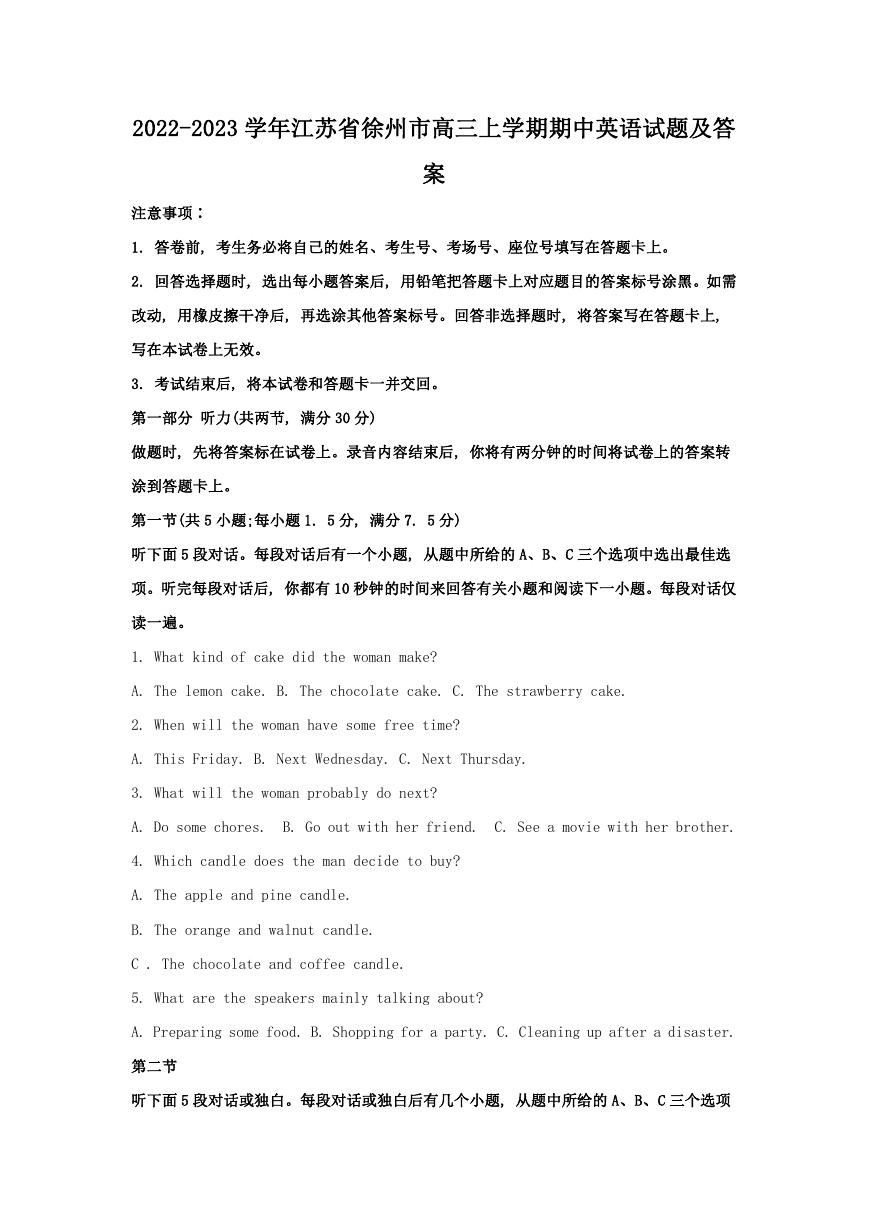
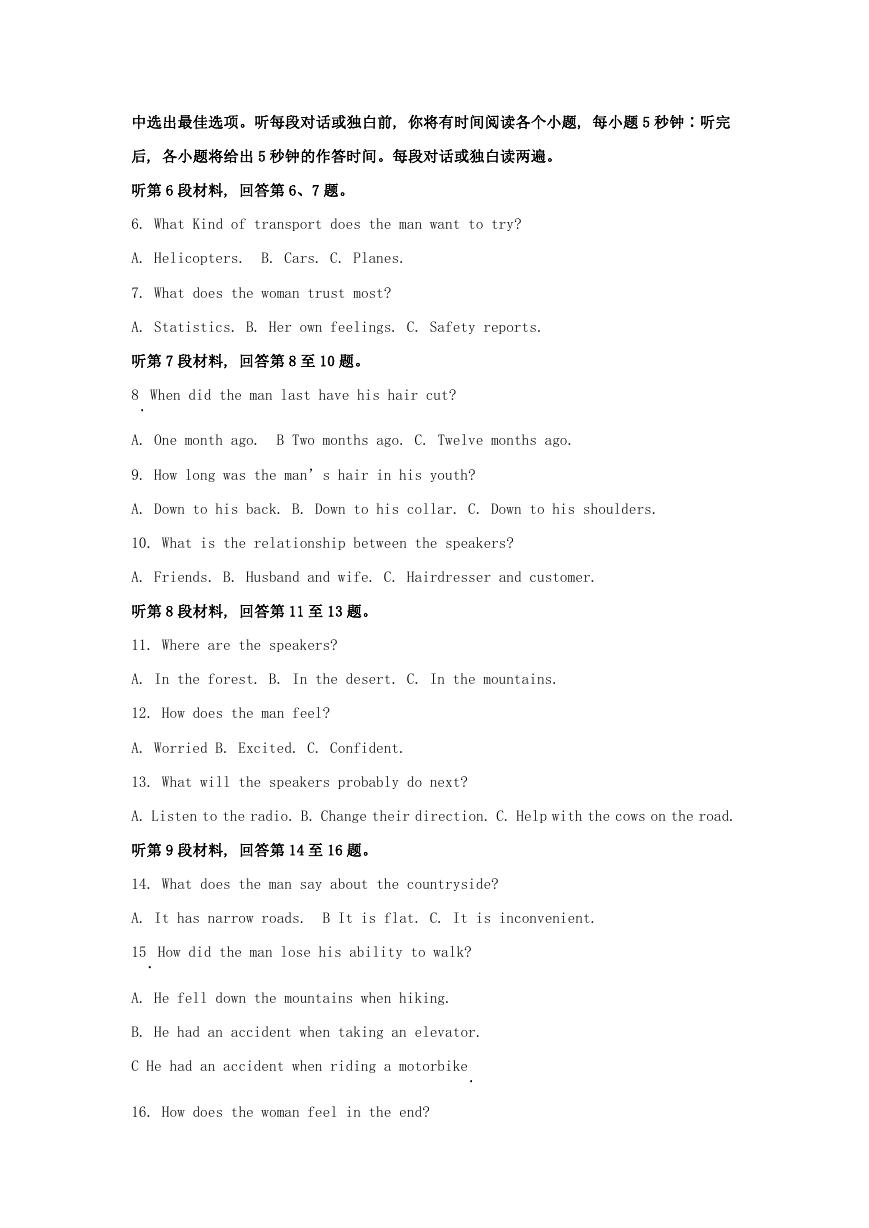
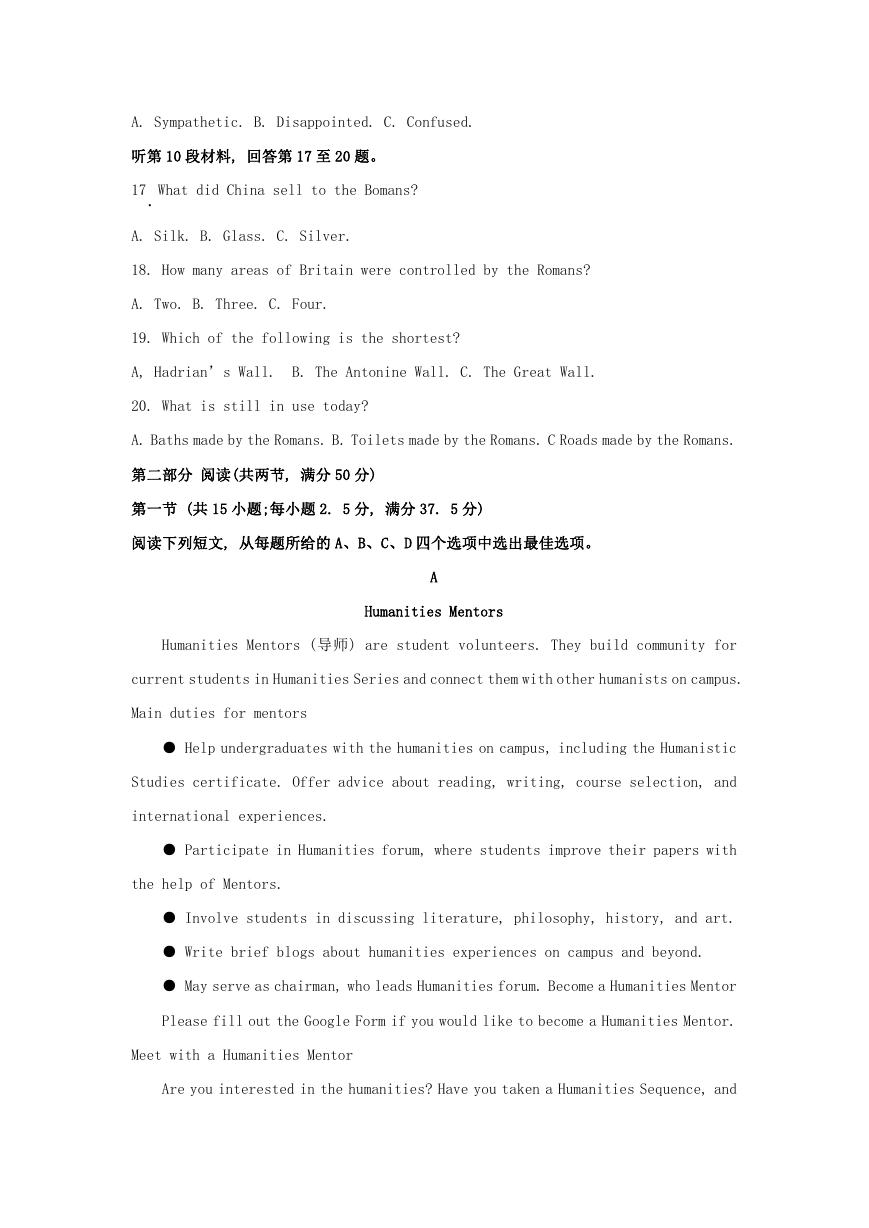
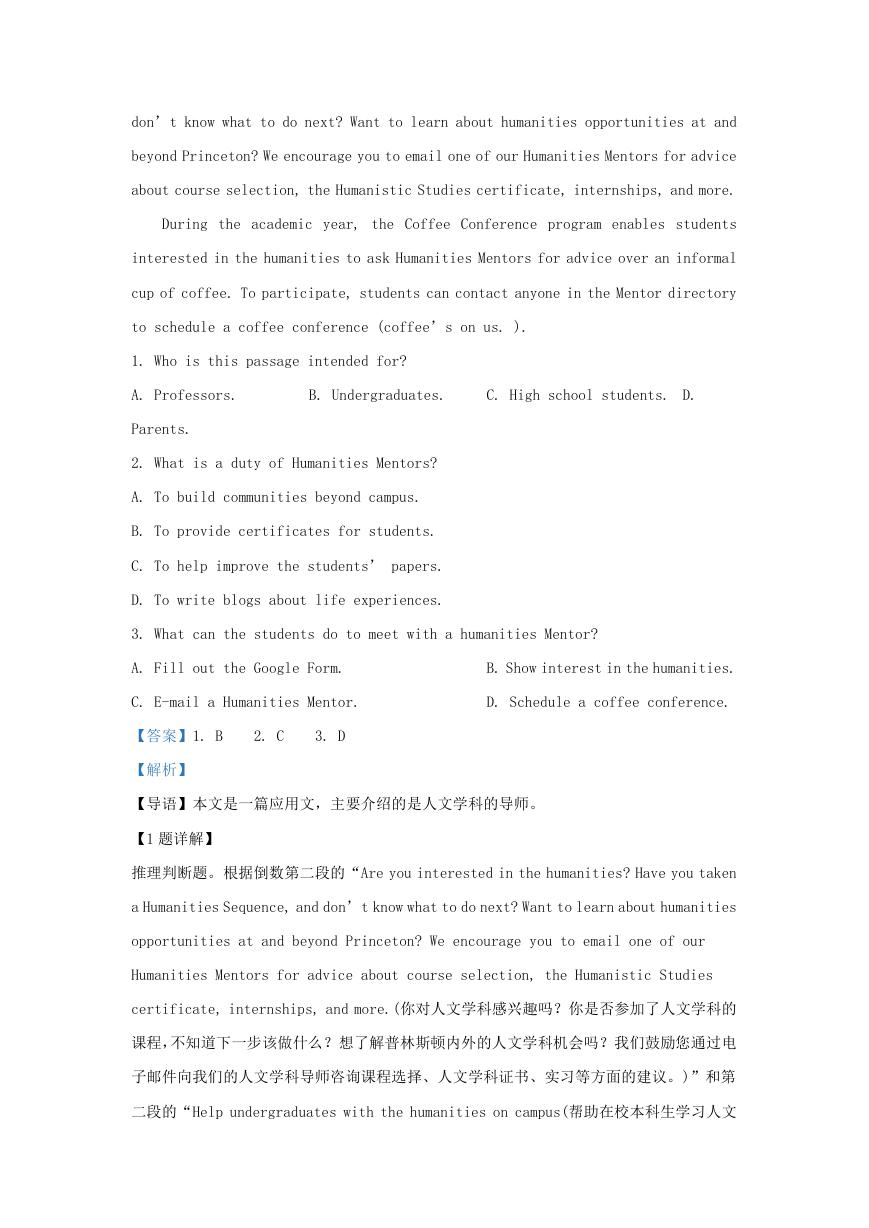
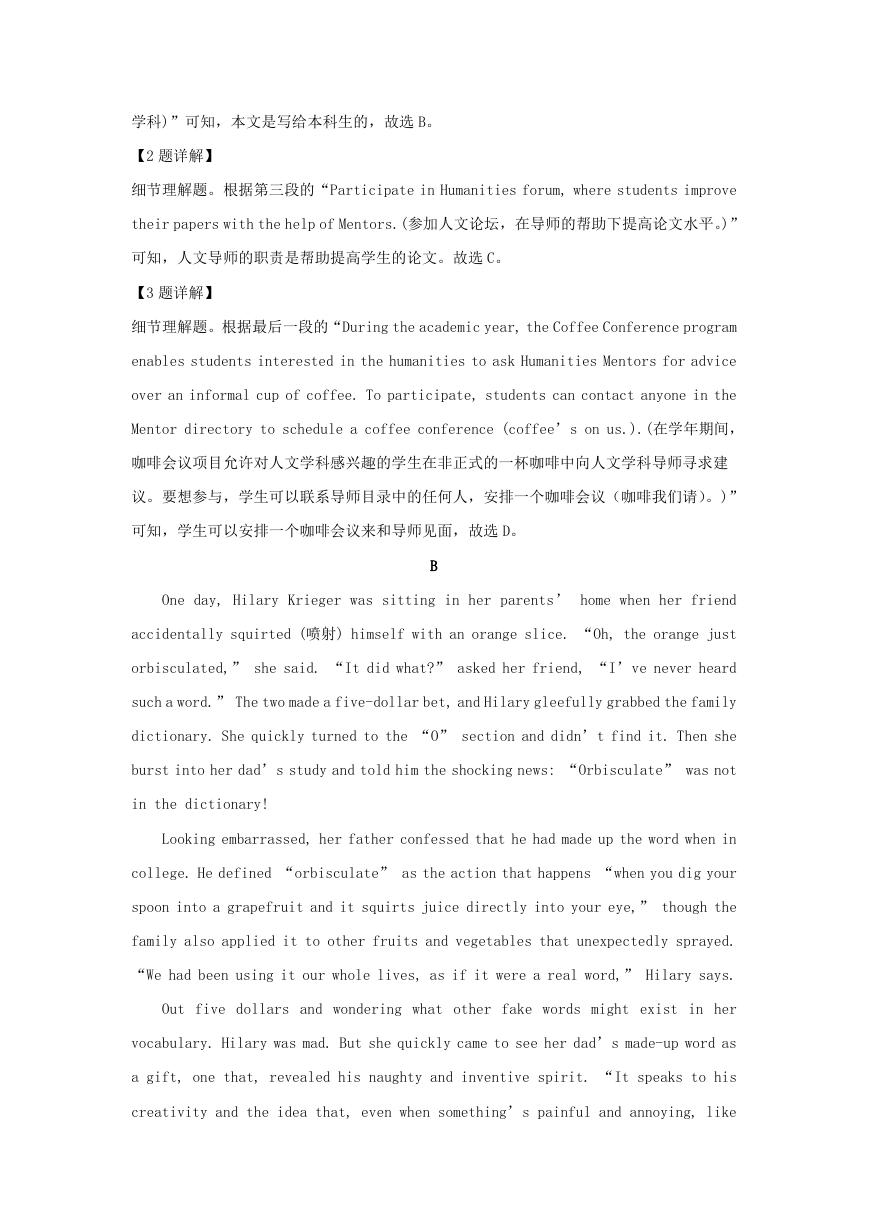
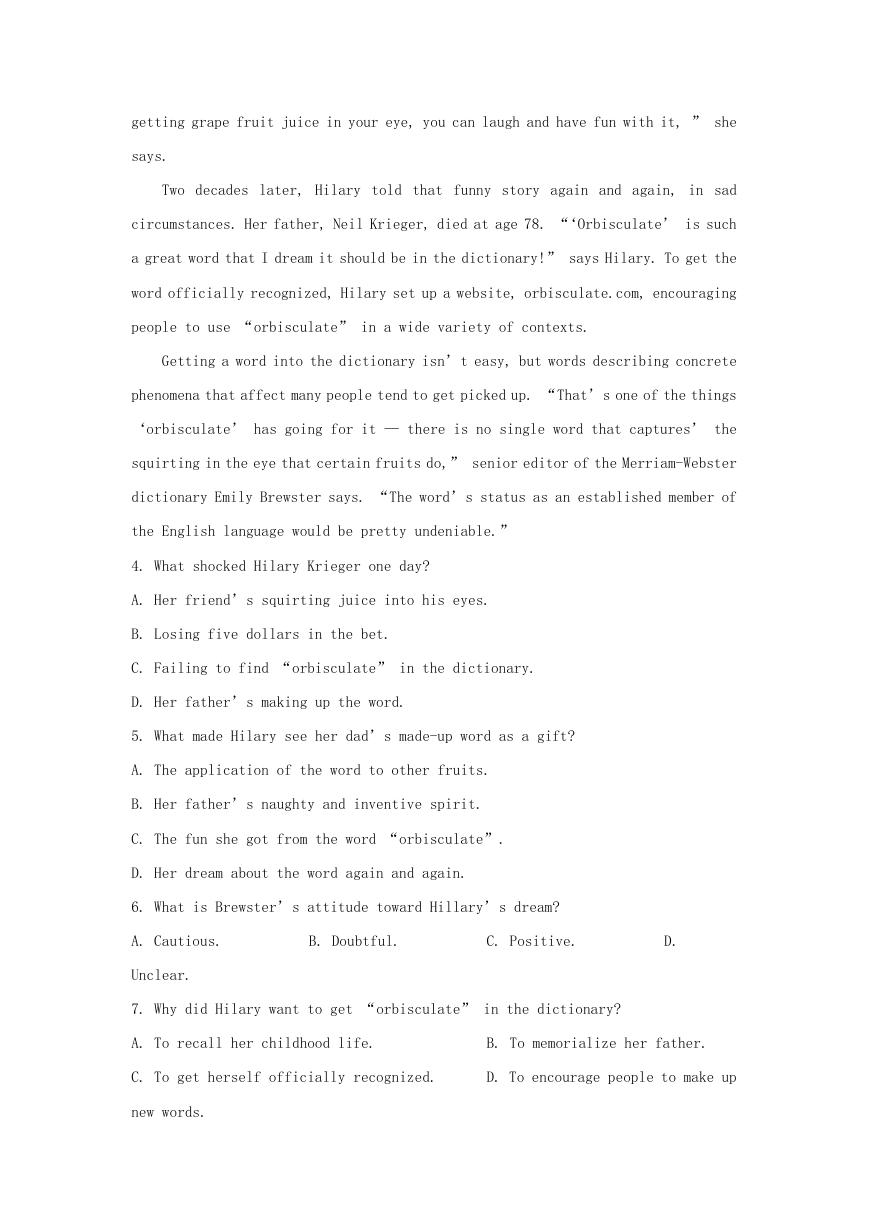
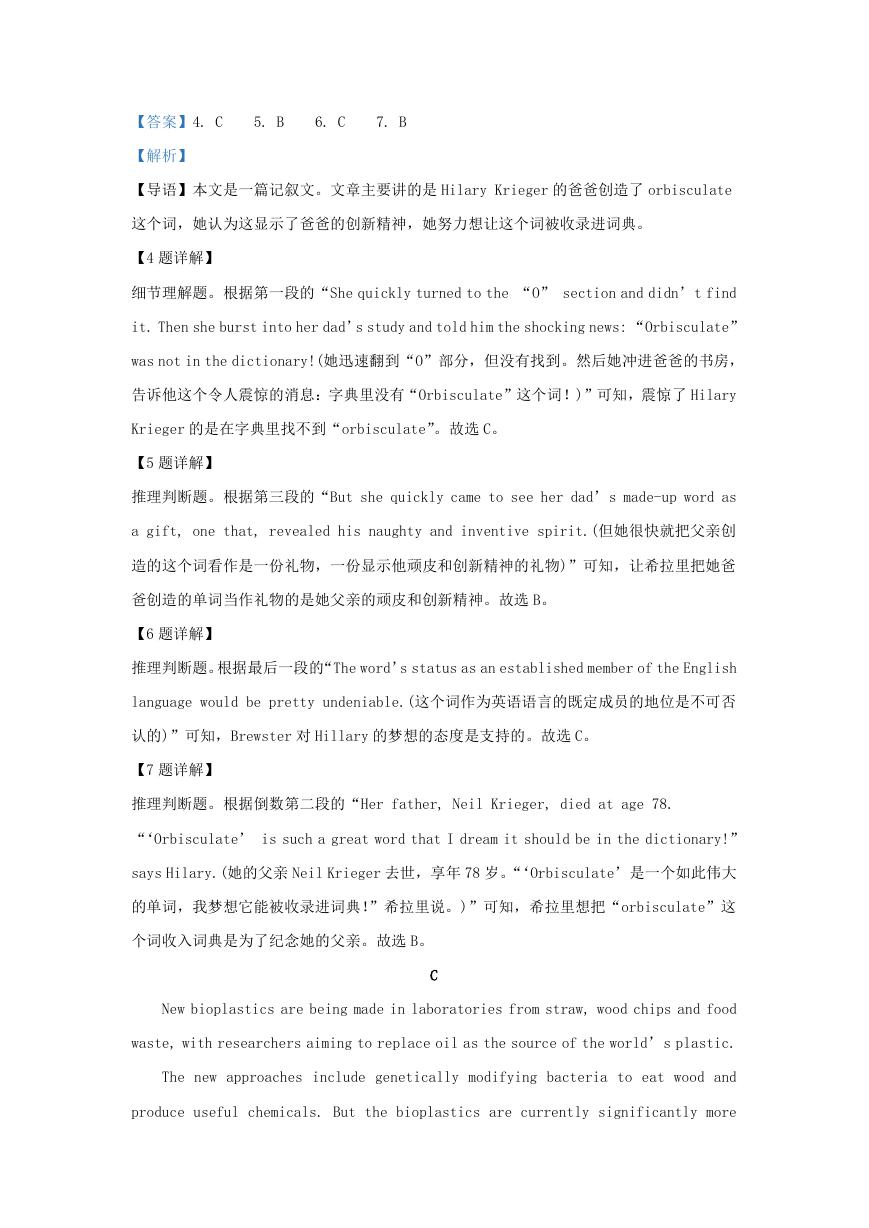
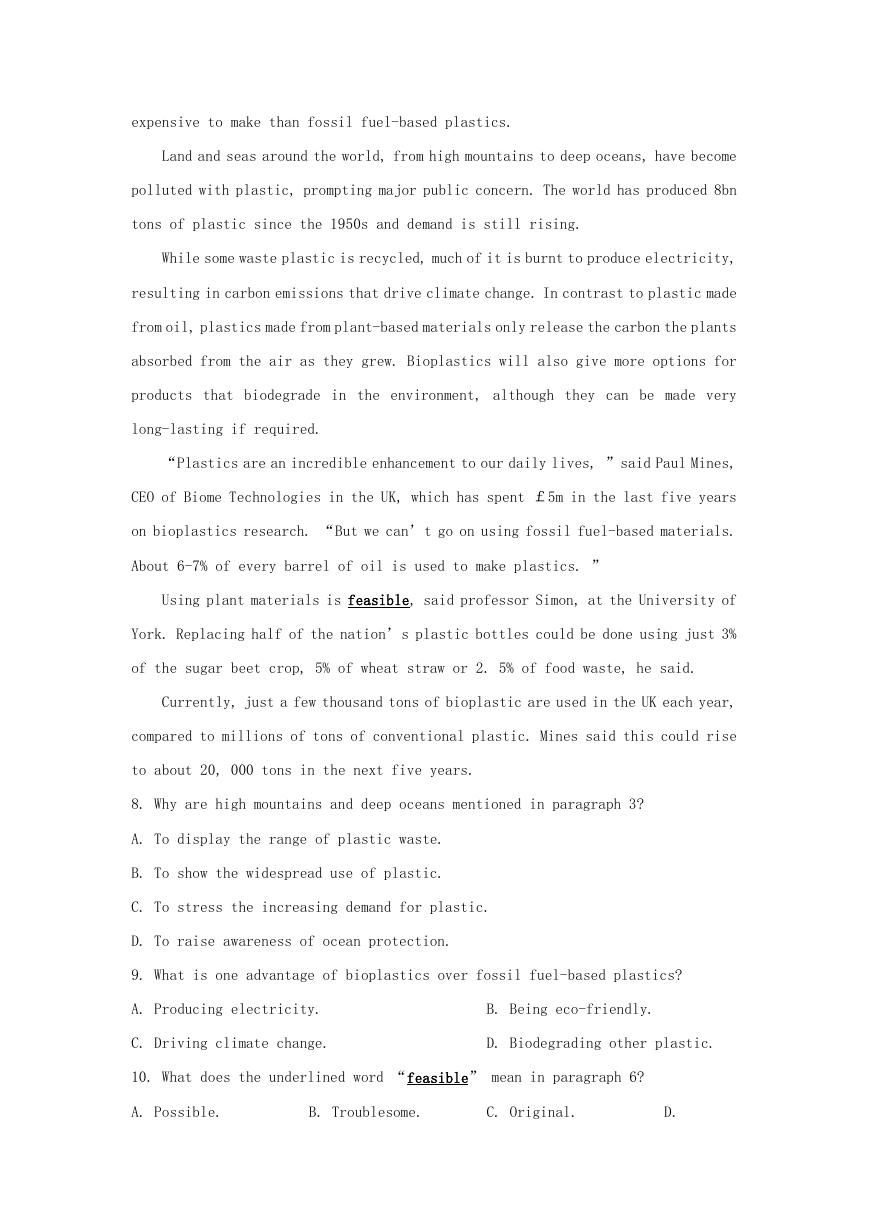








 2023年江西萍乡中考道德与法治真题及答案.doc
2023年江西萍乡中考道德与法治真题及答案.doc 2012年重庆南川中考生物真题及答案.doc
2012年重庆南川中考生物真题及答案.doc 2013年江西师范大学地理学综合及文艺理论基础考研真题.doc
2013年江西师范大学地理学综合及文艺理论基础考研真题.doc 2020年四川甘孜小升初语文真题及答案I卷.doc
2020年四川甘孜小升初语文真题及答案I卷.doc 2020年注册岩土工程师专业基础考试真题及答案.doc
2020年注册岩土工程师专业基础考试真题及答案.doc 2023-2024学年福建省厦门市九年级上学期数学月考试题及答案.doc
2023-2024学年福建省厦门市九年级上学期数学月考试题及答案.doc 2021-2022学年辽宁省沈阳市大东区九年级上学期语文期末试题及答案.doc
2021-2022学年辽宁省沈阳市大东区九年级上学期语文期末试题及答案.doc 2022-2023学年北京东城区初三第一学期物理期末试卷及答案.doc
2022-2023学年北京东城区初三第一学期物理期末试卷及答案.doc 2018上半年江西教师资格初中地理学科知识与教学能力真题及答案.doc
2018上半年江西教师资格初中地理学科知识与教学能力真题及答案.doc 2012年河北国家公务员申论考试真题及答案-省级.doc
2012年河北国家公务员申论考试真题及答案-省级.doc 2020-2021学年江苏省扬州市江都区邵樊片九年级上学期数学第一次质量检测试题及答案.doc
2020-2021学年江苏省扬州市江都区邵樊片九年级上学期数学第一次质量检测试题及答案.doc 2022下半年黑龙江教师资格证中学综合素质真题及答案.doc
2022下半年黑龙江教师资格证中学综合素质真题及答案.doc